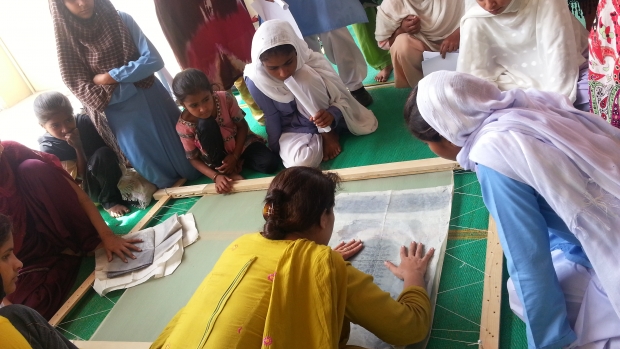Grants :: Small Grant Facilities :: Empowering Fisherfolk Women
Empowering Fisherfolk Women

Stepping Out Of The Shadows, Karachi Pakistan © MFF Pakistan/Sustainable Initiatives, Karachi, 2015
Objectives
Women in Kakapir Village, Karachi economically empowered through innovative Technical Education and Vocational Training (TEVT) and market development approaches
Background
Kakapir is a 100 year old village rooted some 15 km Southwest of Karachi, facing the Arabian Sea. The village evidently lacks basic civic amenities. Electricity became available in the 90s whereas gas pipeline was laid in 2003, even then it is not supplied to every household and many people still rely on mangroves for fuel wood. There is an acute shortage of portable water and literacy rate in both males and females is abysmally low. Since fishing is the only skill they know, it is difficult to accommodate them in other professions. Their dependency on natural resources is evident from the fact that majority of them see fishing as their sole means of earning. Although being part of Pakistan’s financial hub, only a minute minority has explored other options of livelihoods. Secondly, the poverty levels are alarmingly on a rise in fishing villages, further increasing their dependency on natural resources.
It is now established that women play a significant role in socio and economic wellbeing of their families and communities which are dependent on natural resources. However, at the same time women face numerous challenges due to their restricted mobility. Kakapir is a conservative community where women are not allowed to venture out on their own. They neither have employability options nor income generation skills because of which their productive role is almost non-existent. Very few have access to formal income opportunities hence their productive role is diminished.
Sustainable Initiatives (SI) under small grants project aims to develop the productive capacity of local women, without challenging their cultural values, by providing them Technical and Vocational Training in their community and at the same time instituting a system in which their products are marketed by the young men of the same village. The project intends to provide alternate livelihood opportunities to a coastal village, which is solely dependent on fishing. The Technical and vocational training with a strong focus on creating sustainable market linkages will open opportunities for women and youth in the community to seek other and more profitable income options which in turn will reduce dependency on fishing as an only means of livelihood.
Target beneficiaries
Fisher folk women of village Kakapir near Sandspit, Karachi.
Outputs
- Capacity of women developed in technical and vocational skills.
- Local women trained to produce demand driven and marketable items by working in business groups
- Market linkages for trained women (business groups) created through community salesmen selling their products to buyers (wholesalers/retailers)
Accomplishments and challenges
- 65 women trained in professional vocational and technical training in marketable trades of embroidery, stitching and home-based baking.
- Four women groups (5-8 women) trained in embroidery work (adda work) advanced training and linked to market.
- Trained women provided with tools (embroidery frame) and the requisite material to start home-based enterprises.
- Women have started receiving seasonal orders from neighbors and relatives. One beneficiary has set up a tailoring shop in her house and accruing monetary benefits by working on small orders. Some other trainees are getting orders from their relatives and friends and with more experience they would be able to take work orders from market too.
- At the start, there was lot of enthusiasm among the women during training session, even the women from other villages and island also came and attended the sessions. However, due to internal community conflicts, the beneficiaries of certain political and community affiliation discouraged women of other political and community groups, resulting in high dropouts subsequently.
Contributions to cross-cutting themes
The project is designed to engage the marginalized groups including women and youth in Kakapir village due to poor literacy, mobility issues, and limited income opportunities. The diversification of income options for the fisherfolk household will also contribute to building resilience capacity of the beneficiaries against the risks of climate change and other disasters.
Lessons Learned
- Women of Kakpir turned out to be very enterprising as they acquired and mastered the skills in very short span of time. However, because within the community there is no culture of enterprise development they were unable to visualize themselves running micro enterprises. Through various games, activities and rewards they were encouraged to sell their products because of which their self-confidence increased.
- Kakapir is situated right next to the most visited recreational beach in Karachi. The area is in close vicinity to the largest truck stop, where bakery and confectionery items have great market potential. Similarly, a naval base and housing society near the village has potential for stitched and embroidered products.
- The project did not factor in that the community level conflicts would discourage women participation. Since the project engaged females more than males, the male buy-in for the project has been less. Due to limited time frame and resources of the project, the staff could not start a proactive conflict resolution and awareness raising sessions with male members of the community. However, informal open sessions were held to make them realize the potential of women and their financial role in familial and community uplift.
Project Facts
Country
Location
Karachi Pakistan
Topic
Duration
1st Oct 2014 to 30th Jun 2015
MFF Grant Amount
PKR2,272,000
Co-financing Partner
Sustainable Initiatives Karachi, PKR128,000 (in-kind)
Implementing Partner
Sustainable Initiatives (SI), Karachi
Seema Khurram, Executive Director
Email: skhurram@sustainableinitiatives.org.pk
“I am planning to start a training centre for hand embroidery in the community school and have talked to the principal. I will charge a nominal fee to cover the material cost. This training will help the girls learn something useful for their future. Currently, I am working on four orders for my cousin’s wedding, and it is so much fun (Ms. Aisha, a trained girl from the Kakapir village).”